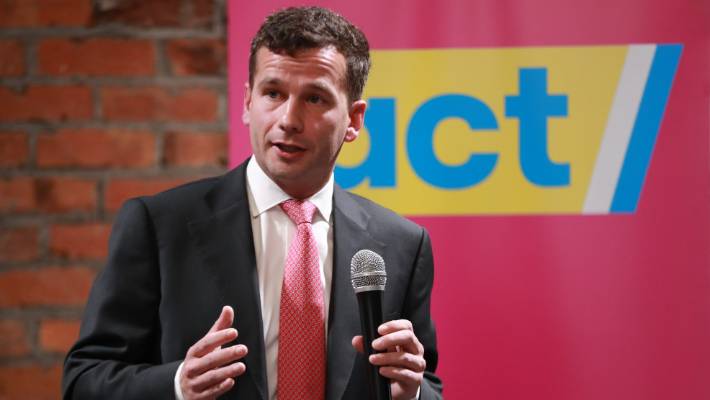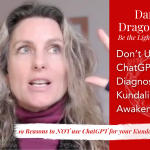This morning I attended an event where David Seymour, leader of the ACT Party was speaking.
I listened with curiosity, as I’m not aligned with any political party, and I wanted to understand Seymour’s perspective and vision for New Zealand.
He began by telling us that this was primarily a listening exercise so he could understand the concerns of the community. And then he spoke for 35 minutes before inviting questions for the final 25 minutes.
I noticed that there were many unexamined assumptions in his speech, and very obvious framing of issues and questions.
There were definitely a few key questions I wanted to ask, based on those unexamined assumptions, and that framing. I also noticed that my heart was beating pretty damn fast, and my nervous system was definitely ramping up…
But when he opened the floor to questions, I stayed silent, and listened, noting the way he took and responded to questions.
When he said there was time for one more question, I found myself putting up my hand and beginning to speak. I noticed that I was scared, and my voice was quavering, and yet there was also a sense of steadiness.
Seymour had spoken about his concerns about co-governance.
“ACT opposes co-governance — it’s divisive and represents a serious departure from the idea that all New Zealanders have equal rights”. — ACT website.
I can’t remember exactly what I said but it was something like this.
“I noticed that when you spoke about co-governance and the Treaty of Waitangi, it didn’t feel to me that you had an understand of the impact of colonization on Aotearoa. The Treaty was dishonoured right from the beginning, and rather than a partnership what we’ve seen is the imposition of Pakeha worldview upon New Zealand, with Te Ao Māori pushed to the side. I agree that we need to have discussions about co-governance, but it feels to me that you’re speaking solely from a Pākehā perspective, and haven’t necessarily done the work to decolonise your mind. I would love to see, by the next election, that you’ve done that work and can bring it into ACT’s perspective on co-governance.”
I also pointed out that the way he spoke about this, to a room of mostly Pākehā folk felt like a wink, wink, nudge nudge kind of thing, and would he have spoken in the same way if there were more Māori in the room? There’s a term for this — race-baiting. He definitely did it, I felt it, and it did not feel ok.
He began to respond, by attacking me, but I interrupted him, and asked him to not make it personal, but to respond to the issue I was raising about understanding colonisation and the marginalisation of Te Ao Māori in wider New Zealand society.
He changed tact, and responded that “I am Māori, and I started charter schools which were to support young brown children who were experiencing racism at school.”
At that point, I realised that my question — or request — had emotionally impacted him, or thrown him. That took me by surprise. It made me wonder if I could have been more skilful in how I spoke up.
Seymour did say more, including telling me off — I can’t remember his words, but how dare I come into this meeting and say these things to him etc. I felt taken aback at this — surely raising the issue of decolonisation is relevant to any discussion of co-governance?
Why was he attacking me?
At that point, he wrapped the meeting. I did manage to squeeze in a few words, thanking him for answering me, and for his candour. I spoke warmly, and with genuine thanks, but it wasn’t acknowledged.
And I felt shell-shocked. I hadn’t expected the politician at the front of the room to personally attack me for asking a question. The man sitting beside me said quietly, ‘That was very brave.”
In that moment, I so appreciated his acknowledgement.
I had felt like I couldn’t sit silently, in collusion, with what felt to me like a very subtle form of racism. Or maybe not so subtle. It felt glaringly obvious to me — which is why I found myself speaking up.
I sat and spoke to the man beside me for a few minutes, grateful for his presence and steadiness. Then, when I saw David Seymour about to head for the exit, I stepped up to greet him, say thank you, and connect, human to human. He was shaking someone else’s hand on the way out, and so I waited.
But when it was my turn, he turned slightly and refused to shake my hand, and again, told me off — telling me it wasn’t ok for me to come into the space and say those things.
He said I’d called him ignorant, which I hadn’t. I had inquired if he’d read Ranginui Walker’s book Struggle without End and suggested it was a great place to start. He was definitely pissed off at me, and not afraid to express it.
I felt a quickening of emotion, and a jolt of shock, aware that other people in the room were noticing Seymour cut me down, and refuse to shake my hand.
And yeah, I was shaky afterwards. I took myself to the bathroom and took a moment to gather myself and to reflect on what had unfolded. And I pondered — was the emotion I felt mine, or Seymour’s? Because there was definitely emotion there. I could tell that I’d touched on something within Seymour’s psyche. Possibly I’d even brushed up against one of his core wounds — which would explain why he’d taken my queries personally, and had reverted to attacking me rather than explore the question.
Now, I’m reflecting on the exchange and pondering if I could have done a ‘better’ job. I’m not sure antagonising Seymour is beneficial — not for co-governance nor for decolonisation.
However, regardless of how skilled or unskilled I might have been, the big win for me was in speaking up. The win came in naming what I was noticing and feeling, and in saying, this doesn’t feel ok to me. It felt like he was being racist, and I wasn’t going to let it go past.
Because it doesn’t —our country has been largely dominated by Pākehā worldview, systems of government, systems of health, systems of education… all of it.
And the Treaty implied that Māori were stepping into a partnership. However the underlying belief that many Pākehā held was that Māori were inferior, and Te Ao Māori was inferior.
The assumption that the British Crown made was that the Treaty gave it the right to take over New Zealand and run it according to the ways of the Pākehā. I don’t think that was the Māori assumption at all.
For example, Māori were largely locked out of the earliest elections because the 1852 New Zealand Constitution Act restricted voting to those men who individually owned property. Māori owned property communally.
This is just ONE example of the ways in which laws were imposed upon Māori that had everything to do with dominance and control and nothing to do with partnership.
A true partnership would have meant that Māori and Pākehā leaders would have sat around the table and asked ‘How do we determine voting rights in a way that includes all?’
And, as an aside, in a communal property rights culture, I’m sure that no Māori was ever homeless. Even in 19th century England, plenty of people were homeless. A culture that prioritises individual property rights doesn’t necessarily deliver the most beneficial living situation for all its people.
Imagine if the Constitution had awarded votes ONLY to those who communally owned property? How would that have changed our country?
When Seymour talks about wanting to live in a country where all New Zealanders are equal before the law, he’s ignoring our history, and the ways in which Pākehā government has repeatedly used the law to marginalise and disenfranchise Māori. It’s not about being equal under the law, it’s about recognising that there are two world views here and BOTH are valid. It’s about discussions on how to value and honour and enfranchise BOTH world views into our systems and institutions.
My expectation was that we could explore this issue with more grace, more listening, and more curiosity. That’s how I move through the world.
But I recognise I stepped into a space where this isn’t necessarily how other people engage. I felt Seymour attempt to dominate the space between us, attempt to shut me down, attempt to marginalise me… all the things that colonialism does so well. He demonstrated, in his response to me, exactly what I was pointing out.
I don’t take it personally though — Seymour is just acting out his conditioning, based on his agenda, and attempting to protect himself from what he perceived as an attack.
I’m grateful for the exchange, and all I learned from it. And I’m pretty sure I’ll be integrating some emotional residue in my system when I practice tonight!
Oh — I’ve also realised, after doing some internet research, that this is a big issue for Seymour and ACT. I’d touched on something that’s already had a lot of news coverage, which I hadn’t read. It’s possible he thought I was there to deliberately antagonise him on this point, which I wasn’t. There were a few other points I could also have made… but this was the one which happened to roll of my tongue when I began to speak.





